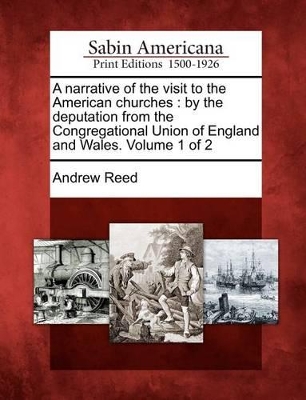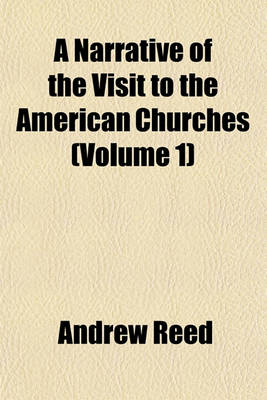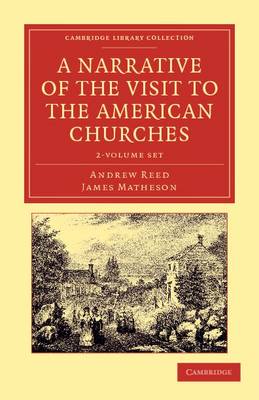Cambridge Library Collection - Religion
2 primary works • 4 total works
Volume 1
Andrew Reed (1787-1862) was a Congregational Minister and one of the leading philanthropists of his day, fund-raising for and founding a number of orphanages and asylums. In 1834, he and fellow Congregational Minister James Matheson (1766-1840) were sent to the Congregational churches of the United States, in order to promote peace and friendship between the two communities. This two-volume 1835 work consists of thirty-nine letters in which the authors recount their journey, and their meetings with their fellow Congregationalists. They visited a large number of cities, mostly on the Eastern Seaboard, and made one excursion to Canada. In Volume 1, the focus is on their arrival in America and their first impression of the country and its people. They note with approval that that 'there is less claptrap, less trifling, and no frivolity' in Congregational services in the United States, as compared with England.
Volume 2
A Narrative of the Visit to the American Churches: Volume 2
by Andrew Reed and James Matheson
Published 23 February 2012
Andrew Reed (1787-1862) was a Congregational Minister and one of the leading philanthropists of his day, fund-raising for and founding a number of orphanages and asylums. In 1834, he and fellow Congregational Minister James Matheson (1766-1840) were sent to the Congregational churches of the United States, in order to promote peace and friendship between the two communities. This two-volume 1835 work consists of thirty-nine letters in which the authors recount their journey, and their meetings with their fellow Congregationalists. They visited a large number of cities, mostly on the Eastern Seaboard, and made one excursion to Canada. Volume 2 tells of the many different communities that Reed and Matheson encounter in America, and the focus is mostly on theological and educational issues. They approve of female academies, asking rhetorically, 'why should not our daughters, equally with our sons, possess the advantages, which these institutions ... so readily supply?'.
A Narrative of the Visit to the American Churches (Volume 1)
by Andrew Reed
Published 31 December 2009
Andrew Reed (1787-1862) was a Congregational Minister and one of the leading philanthropists of his day, fund-raising for and founding a number of orphanages and asylums. In 1834, he and fellow Congregational Minister James Matheson (1766-1840) were sent to the Congregational churches of the United States, in order to promote peace and friendship between the two communities. This two-volume 1835 work consists of thirty-nine letters in which the authors recount their journey, and their meetings with their fellow Congregationalists. They visited a large number of cities, mostly on the Eastern Seaboard, and made one excursion to Canada. In Volume 1, the focus is on their arrival in America and their first impression of the country and its people. They note with approval that that 'there is less claptrap, less trifling, and no frivolity' in Congregational services in the United States, as compared with England.
A Narrative of the Visit to the American Churches 2 Volume Set
by Andrew Reed and James Matheson
Published 23 February 2012
Andrew Reed (1787-1862) was a Congregational Minister and one of the leading philanthropists of his day, fund-raising for and founding a number of orphanages and asylums. In 1834, he and fellow Congregational Minister James Matheson (1766-1840) were sent to the Congregational Churches of the United States, in order to promote peace and friendship between the two communities. This two-volume 1835 work consists of thirty-nine letters in which the authors recount their journey, and their meetings with their fellow Congregationalists. They visited a large number of cities, mostly on the Eastern Seaboard, and made one excursion to Canada. In Volume 1, the focus is on their arrival in America and their first impression of the country and its people. Volume 2 tells of the many different communities that Reed and Matheson encounter in America, and the focus is mostly on theological and educational issues, including the education of girls.



